Front Porch Blog
Key upcoming dates
WV DEP 401 decision: Due by Dec 31, 2021
U.S. Army Corps 404 decision: January 2022
Fourth Circuit cases, FERC amendment vote: likely Q1 2022
On Dec. 3 — after more than eight hours of public, industry and agency comments spread over two days — six of the seven members of the state Air Pollution Control Board voted to deny the air permit for the Lambert Compressor Station.
Despite presentations from the Virginia Department of Environmental Quality and representatives from Mountain Valley Pipeline that argued for approval of the project, the board was ultimately swayed by overwhelming recommendations from locally impacted landowners, advocates, health officials and attorneys who spoke against the compressor station.
The facility would have been the sole compressor station for the Southgate Extension of the Mountain Valley Pipeline and would have emitted particulate matter and other hazardous air pollutants that are unsafe for human health at any exposure level.
The site proposed for the facility was near two existing compressor stations that have polluted rural, environmental justice communities in the eastern half of Pittsylvania County for nearly six decades.
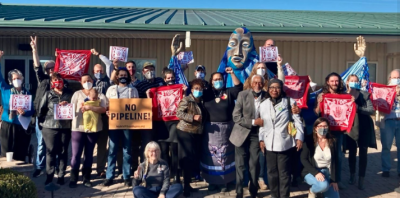
Pipeline opponents celebrate after the Air Pollution Control Board denied a permit for the Lambert Compressor Station. Photo courtesy of Caroline Hansley, Sierra Club
The focus of the board’s findings that led to the decision to deny the permit, as well as members’ questions toward DEQ and other commenters throughout the two-day hearing, was on environmental justice and cumulative impacts from the existing compressor stations, including the toxicity of particulate matter that would be emitted from the facility. Appalachian Voices’ comments on these aspects submitted to DEQ earlier this year were featured heavily in the comments delivered by other speakers during the proceedings.
The authority for the board to deny the permit in order to prevent disproportionate impact on environmental justice communities was a direct result of all of the hard work fighting against the Buckingham compressor station for the cancelled Atlantic Coast Pipeline by the Union Hill community.
DEQ failed to consider environmental justice impacts in its recommendation to approve the Buckingham station and downplayed these same concerns during the Lambert hearing.
Although there are still lingering issues with eminent domain and the threat of the pipeline remains, this was a major blow to the viability of the Southgate extension, and could potentially spell trouble for other gas-fired compressor stations across the country and the Mountain Valley Pipeline as a whole.
Violation Vigil
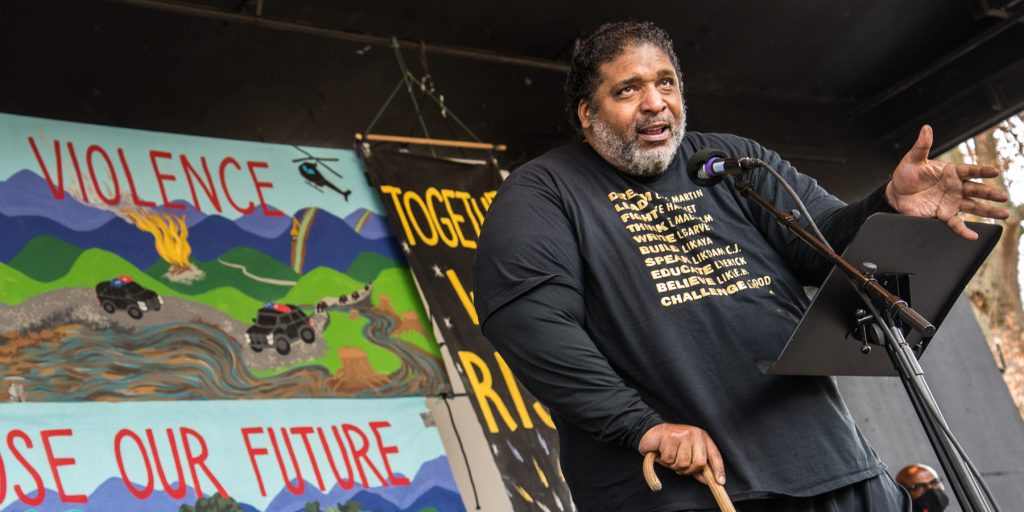
Dr. Rev. William Barber II gave a powerful speech at the Violation Vigil. Photo by Will Kerner Photography
The gathering was the brainchild of the creative force behind ARTivism Virginia, a Charlottesville-based advocacy organization. The imaginative use of visual language and art has long been a gift ARTivism Virginia has brought to multiple fossil fuel fights.
For this project, they proposed an artistic and deeply meaningful idea to partners across the state to reflect on the years of harm the Mountain Valley Pipeline has wrought on Southwest Virginia. Appalachian Voices was proud to support the event, helping with planning, participant and sign coordination, and media outreach. The Violation Vigil featured collaboration of over 10 organizations.
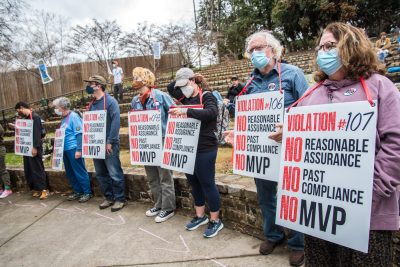
Pipeline opponents at the Violation Vigil wore signs representing each of the more than 300 water quality violations. Photo by Will Kerner Photography
The event reclaimed the regulatory language of the violations, stating there was “no reasonable assurance” that MVP could maintain water quality standards. The hundreds of signs displayed at the event showed the magnitude of abuses committed by MVP, and participants were invited to share specific details about the violation and waterway they represented on stage.
The vigil gave an opportunity for our voices, united in opposition to the project, to be heard, in direct contrast to the Dec. 14 State Water Control Board meeting, where the DEQ officially prohibited any public comment on the MVP. The vigil crowd heard inspiring speeches from Rev. William Barber, who said of the Mountain Valley Pipeline “This is sin, and we’ve got to call out sin.”
Rasoul, Jason Crazy Bear Keck, Emily Satterwhite, David Sligh and Sonya Taylor shared inspiring words with the crowd, and Yara Allen, Joe Troop, the SUNSiNG Collective and members of After Jack, and NO BS Brass Band energized the attendees with powerful music.
The moving event was emceed by Russell Chisholm, Co-Chair of the POWHR Coalition, and Kay Ferguson, Co-Director of ARTivism. ARTivism prepared this video of the day, and the full livestream can be viewed here.
State Water Control Board meeting
That spirit of unity was carried into the State Water Control Board meeting, held on Tuesday, Dec. 14 in Richmond, where opponents gathered before the meeting, carrying a banner that read: “It’s time to choose our future.” The meeting included deliberation of the U.S. Clean Water Act 401 permit for the pipeline.
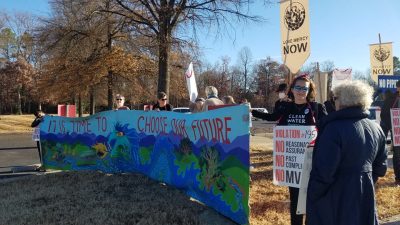
Protesters outside the State Water Control Board meeting urged the board to deny the pipeline’s permit. Photo by Jessica Sims
A recent report from Wild Virginia places the actual number of violations at three times that amount. As reflected in the submission from Appalachian Voices and over 900 of our members and supporters during the public comment period, the application had insufficient data and provided no assurance construction will comply with state water quality standards.
DEQ used procedural privilege to prohibit public engagement and forbid commenters the chance to respond to misleading materials prepared for board members.
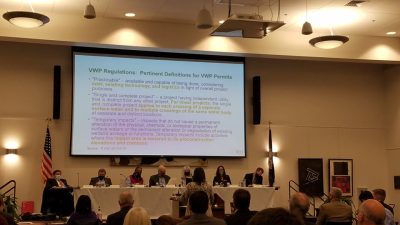
DEQ staff presented information to the Water Control Board. Photo by Jessica Sims
Alarmingly, DEQ’s water permitting director claimed there were no “fenceline communities,” or communities directly adjacent to or impacted by the project. Certainly, anyone living in a blast zone, or whose private drinking water source or well has been impacted by construction is in a fenceline community. DEQ’s mischaracterization of the negative impacts from the Mountain Valley Pipeline showed their propensity to regulate harm, rather than prevent it.
Ultimately, three of the five board members present granted new permission for Mountain Valley Pipeline to pollute and continue harming the communities of Southwest Virginia. (Board members Paula Jasinski and Ryan Seiger dissented. Board Chair Heather Wood, and member Jillian Cohen were absent).
Although this outcome is deeply disappointing, Mountain Valley Pipeline continues to face a volatile and uncertain future. Having lost a key authorization for the Southgate extension, the project may need to pursue a new compressor station along the mainline route, adding more delay and scrutiny to the proceedings.
MVP also faces many regulatory and legal roadblocks. The ruinous pipeline is missing a 401 authorization from the West Virginia Department of Environmental Protection, a 404 authorization from the U.S. Army Corps, and awaits decisions from the Fourth Circuit Court regarding the U.S. Forest Service case concerning Jefferson National Forest and the Fish & Wildlife Service case concerning the Endangered Species Act.
Additionally, MVP’s request to bore under waterways in West Virginia and Virginia has gone unanswered by the Federal Energy Regulatory Commission.
We are deeply thankful for everyone who continues to support the communities impacted by this extractive, harmful fossil fuel project. Appalachian Voices remains in solidarity with those impacted by Mountain Valley Pipeline, and we will continue to fight until the project is canceled.
PREVIOUS
NEXT
Related News

Leave a comment
Your email address will not be published. Required fields are marked *

I am demanding against drilling into mvp